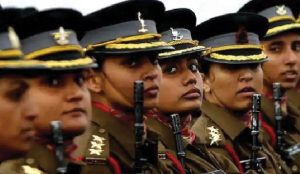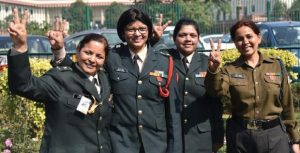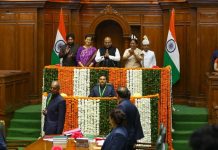 This is the incident of February 21, 2020, in Shakti village of Kullu district of hilly state Himachal Pradesh. In the absence of a mobile phone and ambulance, a pregnant woman was taken by the women of the inaccessible village on a pedestrian 18 kilometers away from the difficult and forested route to the hospital for her safe delivery. The image of “abla” (weak) on the women of the country seems ridiculous with this brave act. But then suddenly dozens of rapes or harassment happening daily in the country raise dozens of questions about the safety of women. And amidst all this the historic order of the Supreme Court giving permanent commission to the women of the Indian Army raises a different kind of hope.
This is the incident of February 21, 2020, in Shakti village of Kullu district of hilly state Himachal Pradesh. In the absence of a mobile phone and ambulance, a pregnant woman was taken by the women of the inaccessible village on a pedestrian 18 kilometers away from the difficult and forested route to the hospital for her safe delivery. The image of “abla” (weak) on the women of the country seems ridiculous with this brave act. But then suddenly dozens of rapes or harassment happening daily in the country raise dozens of questions about the safety of women. And amidst all this the historic order of the Supreme Court giving permanent commission to the women of the Indian Army raises a different kind of hope.
There is no doubt about this, innumerable women of the country are still deprived of the basic facilities of life. The biggest impact of poverty and illiteracy is on them and it bites them again and again like a curse. “International Women’s Day” comes and goes, but in terms of women’s favor, while a lot of helpless pictures come out, there are also very promising changes.
Seal of authority
Let us first talk about the Supreme Court’s decision, which has opened the way for a permanent commission for all women officers in the country’s army. It was already in the Air Force and Navy. The court’s decision is a great honor for women working in the world’s largest armies — the Indian Army — which was their right.
It was a long battle. After about 14 years, the result of this fight came in their favor and the road of permanent commission in the army was opened for women. The Supreme Court, in a historic judgment on February 17, lambasted the government for not taking any decesion, leaving it to the government and the military to decide to give women combat roles.
Before 2016 about 2.5 per cent women were in the Indian Armed Forces. As of January 2019, the number of women in the army was 3.89 percent of the total military force, while in the Navy and Air Force till June 2019 it was 6.7 and 13.28 percent respectively.
Today, when women empowerment is a big issue in the country, the rules regarding women in the Army were really startling. Prior to this decision, the women in army received neither pension nor other facilities, except medical corps and nursing services, where there is already a permanent commission. However, women recruited under the Short Service Commission (SSC) in the army were able to work for only 10 years. Later, the period in the 7th Pay Commission was extended to 14 years.
If we look at the history, it is evident that in the year 2010 itself, the Delhi High Court had given a decision to give permanent commission to women officers. The Delhi High Court had then said in its decision that “we are not doing women a favor but giving them their rights.” Subsequently, in September 2011, the Supreme Court also made it clear that it was not staying the High Court verdict. Then there was the UPA government at the center but nothing happened in this direction. In 2014, the Modi government came to power but even after that no action was taken for six years. Now, women officers have got justice from the Supreme Court.
Although the central government had made a policy of giving permanent commission to women officers in ten departments of the army in February last year, but with the condition that only those women officers who joined the service after March 2019 will get the benefit. As a result, Permanent Commission for women officers were denied to those who had been fighting the legal battle for this right for so long. Not only this, the Center has also filed a plea in the Supreme Court that male soldiers will not be ready to take orders from women officers.
With the decision of the Supreme Court, women officers of the Indian Army will also be able to match the countries where they are given permanent commission. Even though it may take time for them to show their skills in the combat zone, there is no doubt that the order of the Supreme Court is a very inspiring decision for the girls going into the army.
Except for the war zone, women officers will now be able to command in all other areas. Earlier, challenging the decision of the Delhi High Court, the government had cited social and mental reasons for not giving permanent commission to women in the army, for which the government had to be appalled. The court said — “It is discriminatory to deny women this opportunity, it cannot be accepted”. This decision was delivered by the Supreme Court bench of Justice DY Chandrachud.
It is also interesting that women officers in the Air Force and Navy are already getting permanent commission. This was restricted only in the case of women working in the Army.
Actually, a petition was filed about 17 years ago for this discrimination against women in the army. The Delhi High Court’s decision came in favor of the petition and the court said that women should be given commission in the army.
After this, the Central Government challenged the decision of the Delhi High Court in the Supreme Court. After the completion of the hearings of all the parties, the Supreme Court also confirmed the verdict of the Delhi High Court on the issue. Obviously, this is a big victory for women officers working in the army and they are happy after this decision.
After this decision of the Supreme Court, now the women officers will get permanent command in all the areas except the war zone. There are many examples that show that after coming out of the army, women officers had to struggle to find other jobs for livelihood due to lack of pension. After giving the best 14 years of their life to the army and country, they had to face disappointment by being unemployed before the age of 40.
It is also interesting to note that men have been given preference in jobs after retirement. Many are sitting in good positions. Only few women get a better option. Now when woman officers with getting permanent commission will get pension and all other facilities after retirement and at least they will not worry about livelihood.
The second biggest thing will be the court’s decision that they will be able to sit in the commanding post. Ujjwala Chauhan of Kangra in Himachal Pradesh, who has been in the army, says that your greatest desire as an officer in the army is to command your unit. “Now after the court’s decision, women are going to get this honor, so it is a big achievement for them.”
 Women are brave like men, this has been proved many times by women officers with permanent commission in the Air Force and Navy. This gives hope that the decision to field women in the Combat area will also be decided in the coming years. However, the Supreme Court has left the task of taking this decision to the government and the army as it is a policy decision according to it.
Women are brave like men, this has been proved many times by women officers with permanent commission in the Air Force and Navy. This gives hope that the decision to field women in the Combat area will also be decided in the coming years. However, the Supreme Court has left the task of taking this decision to the government and the army as it is a policy decision according to it.
This important decision of the Supreme Court has said that all those women officers who want to opt for this option should be given permanent commission in the army within three months.
Actually there is a difference between short service and permanent commission. By getting a permanent commission, women officers will be able to remain in the army till the age of retirement while under short service they could remain in the army for 10 years which could be increased to 14 years. While in short service, the option of going to permanent commission is also given, but it was only for men.
Similarly, the facility of Common Defense Service Examination for Permanent Commission is still only for men. The short commission consists of entry for Officers Training Academy (OTA) based on written examination and interview of CDS. Physical parameters have to be met. This selection process is for both men and women.
As far as training is concerned, selected candidates in Permanent Commission are sent to IMA, Dehradun for studies and training. While in the short commission, they are sent to study and train at Officers Training Academy (OTA), Chennai.
As far as the Short Service Commission is concerned, women officers can get entry only in Army Service Corps, Ordnance, Education Corps, Judge Advocate General, Engineer, Signal, Intelligence and Electric-Mechanical Engineering Branch. They are not given the opportunity to work in Combat Services such as Infantry, Armored, Artillery and Mechanized Infantry. However, these rules do not apply in the Medical Corps and Nursing Services where women get permanent commission and they have been reaching even to the rank of Lieutenant General.
After the court order, women officers in the army will now be able to get permanent commissions in Judge, Advocate General, Army Education Corps, Signal Engineer, Army Aviation, Army Air Defense, Electronics and Mechanical Engineer, Army Service Corps, Army Ordinance Corps and Intelligence Corps.
The Supreme Court’s comment in this decision of women’s rights is also very strong for the Central Government, which said that “the policy decisions of the Central Government regarding the posting of women officers have been very unique.” Ater the High Court’s decision, the central government should have given a permanent commission in the army to the women officers but by doing so, it has shown bias.
In fact, the Center argued that women should not be commissioned in the army, that it was not possible to do so “due to physical limitations and social norms”. The court commented that the Centre’s plea of not giving permanent commission is disturbing and cannot be accepted at all.
What the court said is a lesson for governments. The court said that women officers have shown bravery for the country. Even after 70 years of British rule, the government needs to change the mindset to end gender discrimination in the armed forces. The court said that women have had great achievements and role in the army and doubting their abilities would be an insult to not only women but also the army.
 Interestingly, there is an option of permanent commission for women officers in the Air Force. In the Air Force, women can join Combat Rolls which include flying and ground duty. Not only this, under the Short Service Commission, women can also fly helicopters and fighter jets in the Air Force. As far as the Navy is concerned, women officers can serve in logistics, law, air traffic control, pilots and naval inspector cadres. In the Navy also, women officers already have the option of permanent commission.
Interestingly, there is an option of permanent commission for women officers in the Air Force. In the Air Force, women can join Combat Rolls which include flying and ground duty. Not only this, under the Short Service Commission, women can also fly helicopters and fighter jets in the Air Force. As far as the Navy is concerned, women officers can serve in logistics, law, air traffic control, pilots and naval inspector cadres. In the Navy also, women officers already have the option of permanent commission.
In such a situation, the question arises on the physical and mental capacity of women. Rather, they have proved their abilities in the Air Force and Navy. Therefore, the decision of the court is also a great honor for the ability of women.
Hopefully, women officers will also have the opportunity to work in combat services in near future, including infantry, armored, artillery and mechanized infantry, and will be as much of an asset to the country as their men counterparts have been before.
“We welcome the decision of the Supreme Court to grant permanent commission to women in the army. Prime Minister Narendra Modi, in his Independence Day speech in 2018, supported the idea of permanent commission for women in the army and announced a change in policy for this. The landmark decision for a permanent commission for women in the army came at a time when former Defense Minister Nirmala Sitharaman announced that women would be inducted into the Army Police. The recruitment process of women in the Army Police has started from 2019. It aims to determine the role of women officers to assist in military operations as and when required besides investigating crimes.”
Rajnath Singh
Defence Minister
Effects of court decision
Now all women officers already working in the army under the Short Service Commission will also be entitled to permanent commission. The order of the Supreme Court says that women officers (who have not reached the age of retirement), who have served less than 14 years and above under the Short Service Commission, should be given the opportunity of permanent commission.
However, the Supreme Court has left the decision on the government and army to give women a role in the combat (war) zone. The court termed it as a policy matter. The Delhi High Court also said the same. Obviously, the government will have to think about this now. The court’s decision will allow women officers working in the army to lead a command posting ie unit, corps or command.
How did the matter reach the court
It was the year 2003, when Babita Punia, a woman advocate, filed a petition in the Delhi High Court for the first time to give permanent commission to women in the army. The case went on and in the meantime, in 2009, about six years later, nine women officers of the army filed petitions on the same issue in the High Court, however, these petitions were filed separately.
Only a year later, in 2010, the Delhi High Court in a historic verdict ordered a permanent commission for women in the army. The High Court said in the judgment that women officers who have not yet reached the retirement age should be given permanent commission as well as benefits like promotion. Now the decision that has come from the Supreme Court is similar to the decision of the High Court.
When the country was ashamed
The rape and brutal murder of a female doctor in Hyderabad left the country shaky. In the last week of November, 2019 after raping this 26-year-old doctor from Hyderabad and burning her with petrol, it shows that women are living in such insecurity in the country. Soon after this incident a rape survivor was burnt by the accused after pouring petrol in Unnavin Uttar Pradesh. An embarrassing information about the country’s capital Delhi came to light last year that six rapes occur here every day. In other incidents, in January 2019, a 16-year-old girl’s head as well as every body part was cut and then poured acid on it. In February, a 5-year-old girl was raped and then found dead on the roadside in Mahim area of Mumbai. In March, in UP, a man kidnapped a 16-year-old girl at gunpoint and raped her, the next month a 30-year-old man raped a girl who was going to temple and broke her bones and then ruthlessly murdered. A burnt dead body of a woman was found in Karnataka in April and after investigation it was found that she was also raped. In May, a three-year-old was raped by a man in Jammu and Kashmir while she was playing outside the house. A 17-year-old deaf and mute girl was raped by three men in Rampur, UP. In May itself, three men kidnapped a 16-year-old girl in Noida and raped her for 51 days. The woman, who went for shopping with her husband, was assaulted by five men and then raped her and also made a video of her. In June, a man in Telangana allegedly raped a nine-month-old child and murdered her. In Aligarh, UP, the same month a man lured a four-year-old girl with a greed of 10 and then took her to a secluded place and raped her. A social worker from Mumbai raped a mentally deranged woman. In July, a six-year-old girl was raped by a rickshaw driver in Janakpuri, Delhi. In the school’s music class in Gujarat, two teachers raped a blind student. In September, a very frightening information emerged that more than 30 men had raped a 12-year-old girl in two years. The last note written by the girl’s girl, Sorry, Amma, not only made everyone’s eyes wet, but also filled people with anger. In Jharkhand, the rape of a class four student by a vice-principal and two teachers, sexual harassment of the student of the seventh class student by the principal’s husband came to light when she became pregnant, a woman opposing her husband for tripple talaq was raped by her father-in-law and brother-in-law and in October, a 24-year-old woman committed death by hanging herself when she was gangraped.
Achievements of women in the year 2019
The past year has been outstanding for the achievements of the women of the country. Throughout the year, the women gave the country moments of pride in spite of gender discrimination and all the stereotypes. It was on December , 2019 when Sub-Lieutenant Shivangi Swarup became the first woman pilot in the Indian Navy. Women officers are posted as Air Traffic Control Officers in the Naval Aviation Department.
A few days before this, Lieutenant Colonel Jyoti Sharma became the first Judge Advocate General (JAG) in the Indian Army posted on a foreign mission. According to his new post, inducted Lt. Col. Sharma as a military legal expert with the Government of Seychelles. Anjali Singh, a part of the Indian Army for nearly 18 years, wrote a new saga that brought glory to the country when she became the first woman Defense Attaché of the country on September 10. Before her only men were appointed as military Attaché. Jamia Millia Islamia University (JMIU) always had e male vice-chancellor but in April last year Najma Akhtar made the country proud by becoming the first woman vice-chancellor of the university. This achievement in the field of education is also huge because Akhtar is the first academician to become Vice Chancellor of a Central University (Central University) in Delhi. Chandrima Shah created a different history when she became the first female president in the 85-year history of the Indian National Science Academy (INSA). And not only did the daughters of a tea garden worker from West Bengal learn Rugby and make it to the national team, they were also awarded the “Icon of North Bengal” award.
Wax double of Bollywood actress Deepika Padukone was installed at Madame Tussauds Museum in London. In an assessment of Internet service provider “Yahoo India”, West Bengal Chief Minister Mamata Banerjee was placed second in the list of Most Searched Personality, which is a big thing in itself. The responsibility of the project director of Chandrayaan-2 was entrusted to the female scientist Muthiah Vanita. Flight Lieutenant Hina Jaiswal became the first woman flight engineer in the country in the Indian Air Force. Mumbai’s Captain Arohi Pandit (24) became the first woman in the world to cross the Atlantic Ocean alone in the Light Sports Aircraft (LSA). Gagandeep Kang, a clinic scientist at Vellore Artificial Medical College, India, became the first woman to join the Royal Society.
Gagandeep is the first Indian woman scientist to be selected in the prestigious Fellow Royal Society in the history of 358 years. Chandrani Murmu (25), a tribal woman from Biju Janata Dal (BJD) and an engineer by profession, reached Parliament. She became the youngest female MP. GS Lakshmi of India became the first female referee of the International Cricket Council (ICC) event. Indian women’s cricket team opener Smriti Mandhana was included in
the ICC ODI and T20 squad for the year 2019. The 19-year-old Arjuna Awardee Hima Das, a gold medalist in the Asian Games, created a thunder by winning 6 gold in the year of 2019.












